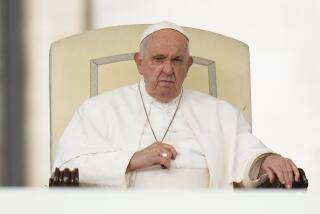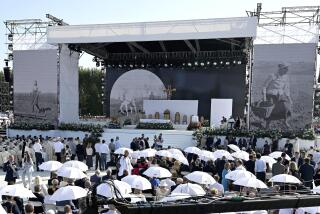John Paul Relives Memories as He Visits Old Haunts in Poland
- Share via
KRAKOW, Poland — Spending a day steeped in nostalgia, Pope John Paul II visited one of the homes of his youth Saturday, stopped at his old university and consecrated a new basilica at a religious sanctuary where he sought comfort during World War II.
“Many of my personal memories are connected with this place,” the Polish John Paul, 82, said at the end of a three-hour Mass he celebrated in the new basilica at the Sanctuary of Divine Mercy.
“I used to come here, especially during the Nazi occupation, when I worked in the nearby Solvay” chemical plant and quarry, the pontiff recalled. “Every day I walked this road, coming to work ... in wooden shoes that one used to wear in those days. How could one imagine that this man in wooden shoes would one day be consecrating the Basilica of Divine Mercy?”
In his ninth visit to his homeland since he became pope, John Paul is receiving a rapturous welcome from ordinary Poles and the nation’s top leadership. Former President Lech Walesa, a onetime shipyard worker who together with John Paul played a key role in undermining communism in Poland, said in an interview after the Mass that John Paul is “the only authority, the only real unquestionable leader” of this country.
That image was reinforced when President Aleksander Kwasniewski and Prime Minister Leszek Miller met separately with John Paul on Saturday evening. Both said afterward that they had discussed a wide range of Poland’s problems, including unemployment, faltering economic growth and the country’s bid to join the European Union.
“He’s in good shape, intellectually perfect,” Kwasniewski said after the talks. John Paul suffers from Parkinson’s disease, and his grueling schedule Saturday left him looking more tired than he had upon his arrival Friday evening, when he seemed invigorated to be home. The pontiff will celebrate an open-air Mass today and return to Rome on Monday.
“I’m absolutely certain that this is not the last pilgrimage [to Poland], as some people think,” Miller said. “From the side of Polish authorities, there’s absolute readiness to have John Paul here as a guest whenever he wants to come. I gave the pope such a declaration, and he smiled and said, ‘Well, if God allows.’ ”
Officials at Jagiellonian University in Krakow, where John Paul studied more than half a century ago, presented the pontiff with an enrollment certificate for “student number one” that specified he is “not obliged to attend every class or pass each exam.”
“This card allows the Holy Father to take up studies in all of our 11 departments, in a symbolic return to the university after many decades,” Rector Franciszek Ziejka said.
The university, initially known as the Krakow Academy, was founded in 1364 by King Casimir the Great. It established a faculty of theology in 1397.
Riding in his bulletproof popemobile, John Paul also stopped in front of a gray two-story house where he lived in ground-floor rooms with his father after they moved from the future pope’s birthplace, Wadowice, in 1938, so that the young Karol Wojtyla could attend university. His mother had already died, and his father died in 1941, but he lived in the house until 1944.
John Paul remained in his vehicle outside, but Grzegorz Bielatowicz, 7, who now lives in the house with his siblings and mother, brought him an oversize bunch of flowers. The boy’s teenage sisters share the room where the future pontiff once slept, their teddy bears occupying the space where he kept his kneeling pad for prayers.
John Paul called Grzegorz into the popemobile, blessed him and gave him rosaries for his family.
“It’s an incredible feeling,” said Dorota Bielatowicz, patting her son fondly. “The pope didn’t enter the house, but we could give him flowers. That’s the most important.”
In his homily at the morning Mass, John Paul declared that “where hatred and the thirst for revenge dominate, where war brings suffering and death to the innocent, there the grace of mercy is needed to settle human minds and hearts and to bring about peace.”
“Wherever respect for life and human dignity are lacking, there is need for God’s merciful love, in whose light we see the inexpressible value of every human being,” he continued. “May this message radiate from this place to our beloved homeland and throughout the world.”
On Saturday evening, keeping up a long tradition, John Paul appeared at the window of the Krakow archbishop’s residence, where he lived for 14 years until his election as pope in 1978. Some of the main rooms he used back then have been left largely untouched, with the same furniture and paintings on the walls, and Polish church officials said that on this pilgrimage, he is sleeping in the same bed he used as archbishop.
After people in the street below greeted the pontiff with chants of “Welcome home,” he began to banter with the mostly youthful crowd, recalling his initial visit as pope in 1979.
“Since our first meeting here at this window, 23 years have passed, and I’m older by 23 years,” he declared. The crowd laughed, applauded and chanted, “You are young!”
“Those who were here 23 years ago ... are also older by 23 years,” the pope continued.
The crowd responded: “They’re also young!”
“Well, there’s nothing we can do then,” John Paul said as the crowd laughed and applauded. “If they’re young, then they’re young. There’s nothing we can do about it.”
The crowd then burst into a song often used at birthdays, “One hundred years. One hundred years. May he live one hundred years!”
John Paul then added: “There’s only one thing we can do.... In spite of old age, in spite of death, [there is] youthfulness in God.”
More to Read
Sign up for Essential California
The most important California stories and recommendations in your inbox every morning.
You may occasionally receive promotional content from the Los Angeles Times.













